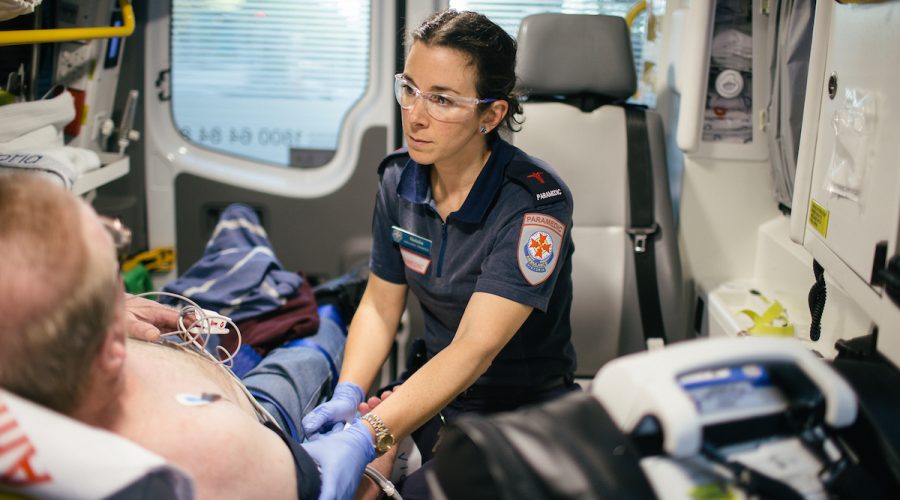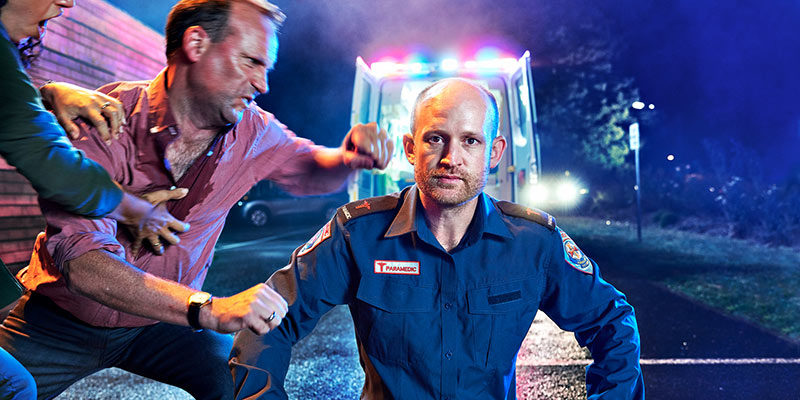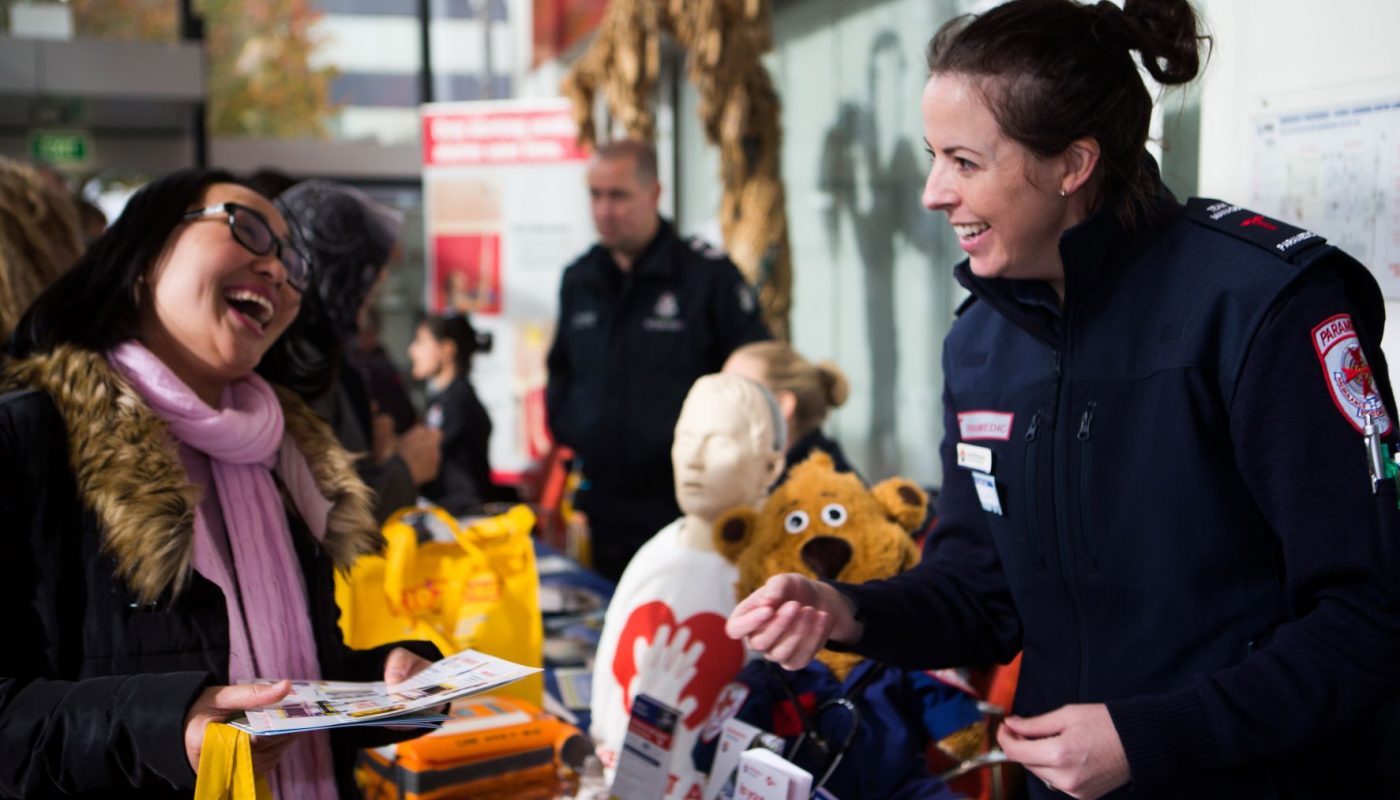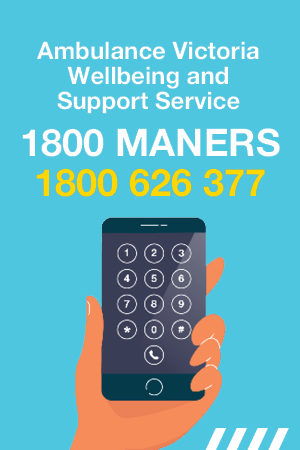
It’s important to know that it is normal for ambulance employees and first responders to be impacted by their job. Paramedicine is a difficult, demanding and rewarding career. Your loved one’s wellbeing will be affected in both positive and negative ways by their work.
Stressful aspects of the role
Many of these factors are a part of the job and hard to change or avoid, however understanding each of them can help to better understand your loved one and how to best support them.
Ambulance employees and first responders are more likely than the general population to be exposed to potentially traumatic events. They may be repeatedly exposed to death, violence, natural disasters, placed at risk of harm to themselves or their colleagues, or other challenging situations. These experiences can increase the risk of developing a mental health condition or make an underlying issue worse, however such exposure does not mean that they will develop Post-Traumatic Stress Disorder. Most often, people overcome these experiences without the need for professional support. See our Tip Sheets for more information:
Attending cases involving a death by suicide can affect ambulance employees and first responders in different ways. For some, such exposure can increase the risk of suicidal behaviour1, however for others, the experience of seeing family members directly impacted by suicide can protect them from developing serious suicidal thoughts2. Considering the capacity to increase suicidal ideation, it’s important to closely monitor your loved one’s wellbeing after they attend these distressing cases. These Tip Sheets on suicide can help with understanding when to be concerned about your loved one and how to have a conversation on suicide if it’s needed:
Although they are in the minority, ambulance operational employees and first responders may work with patients that are aggressive, violent, uncooperative or ungrateful. These cases can be very difficult to handle and may trigger fear, anxiety, anger, and even build attitudes of cynicism towards the communities we are supporting. Against this growing cynicism, you can help your loved one by prompting them to remember the reasons that make them enjoy being a paramedic/first responder (e.g., helping others).

Operational staff respond to patients with a wide variety of concerns. Some cases are simple and straight forward, while others are complex, demanding, and challenging. The variability can be exciting, but uncertainty can also foster anxiety, especially if your loved one is new to the role and still building their confidence. Our page on anxiety details strategies that can help if this uncertainty is becoming an issue for your or loved one.
Shift work frequently causes sleep difficulties in paramedics and first responders. Shift work forces people to work against their natural body clock and can lead to issues with getting to sleep, staying asleep, or staying awake when needed. Lack of quality sleep also makes it harder to regulate emotions, meaning your loved one may become more reactive and prone to negative emotions like anger, irritability and sadness. Shift work, especially with night shifts, is also associated with various health complications including increased risk of obesity, cardiovascular disease, cancer and diabetes. Explore these tip sheets for some ideas on how you could support your loved one’s sleep and minimise the associated effects of shift work:
The workload of paramedics and first responders varies depending on a number of factors but it can at times remain high for sustained periods. Statistics suggest more than half of paramedics experience burnout3 and such high workloads can be a strong contributing factor. This Tip Sheet details what burnout looks like, the usual contributing factors, and strategies for management and prevention:
In the Victorian healthcare system, many issues that impact healthcare workers operate outside of their control. This can be frustrating, and at times leave paramedics feeling powerless, exacerbating states of burnout. Mindarma is an online resource that may help in managing some of that frustration Log in using your email address as the username, and the word exhale as the temporary password.
Given infection control and current management guidelines related to COVID-19, flu, and other infectious diseases currently circulating in the community, paramedics are required to wear PPE when attending all cases. This protective wear can feel uncomfortable and burdensome. Paramedics also face the reality of working with patients that may expose them to an infection risk. This risk may exacerbate fears of contracting the diseases or passing these infections onto loved ones. This Tip Sheet outlines some helpful strategies to cope with COVID-related stress.
What can I do?
Alongside looking through the tip sheets above, you can also help your loved one by suggesting:
AV SMART 2.0® sessions are 90-minute appointments with a Psychologist that serve as a mental health check-up. Consisting of 2 parts, the first involves filling out mental health questionnaires, discussing the results, and brainstorming solutions to start addressing any areas of concern. The second part involves an assessment of self-care and stress management with a view to consolidate and build on positive strategies to strengthen mental wellbeing. Only AV employees and staff members can access an AV SMART-2.0® session. More information on AV SMART 2.0® sessions and how to organise one can be found here.
1800 MANERS (1800 626 377) is an AV-exclusive call service which facilitates access to six different support services.
These include:
- Peer Support (option 1)
- VACU 24/7 counselling line (option 2)
- Chaplains/Pastoral Care (option 3)
- Bullying and Harassment (option 4)
- Police Statements and Court Appearances (option 5)
- Alcohol and Other Drugs Advice and Support (option 6).
View more detail on the services provided within options 1, 2, and 3.
Encourage open and honest conversations with managers and other colleagues
Working as a team to take good care of their physical and mental health – see here for some simple tips on fostering positive physical and mental wellbeing.
Cultivate a healthy outlook on life with a focus on what you can control over what you cannot
Rewarding aspects of the role
Working in emergency services does come with many benefits. AV employees and first responders make a huge difference to the lives of their patients and provide real support to their community. Our people often report gaining a strong sense of joy and achievement from their work. Other benefits include:
- Pride and satisfaction in helping others
- Camaraderie among colleagues
- High level of purpose and meaning
- Positive sense of responsibility and connection to the community
- Excitement and variety in working different jobs
- Clinical skills and experience
During hard times, especially when working through elements of burnout, people often lose sight of the reasons that drove them into their chosen career. Helping your loved one to remember the rewarding aspects of being part of Ambulance Victoria may help to improve their work satisfaction.

References
1Hill NTM, Robinson J, Pirkis J, Andriessen K, Krysinska K, Payne A, et al. Association of suicidal behavior with exposure to suicide and suicide attempt: A systematic review and multilevel meta-analysis. PLoS Med. 2020 Mar;17(3):1-27.
2Beyond Blue. Answering the Call National Survey, National Mental Health and Wellbeing Study of Police and Emergency Services – Final Report. Beyond Blue; 2018. 128 p.
3Thyer L, Simpson P, Van Nugeteren B. Burnout in Australian Paramedics. Int Paramed Pract. 2018 May;8(3):24-32.

